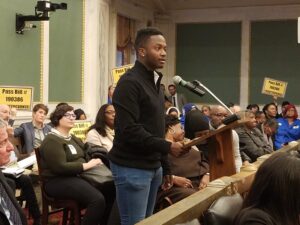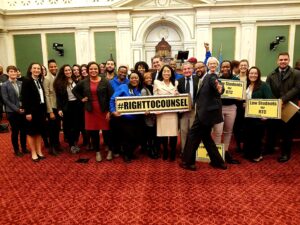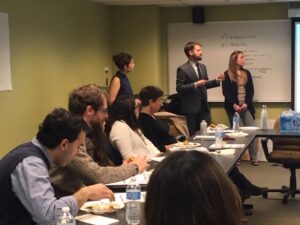An Immigration Judge recently granted an immigrant’s motion to suppress and terminate proceedings after a local police officer made a basic traffic stop and then called ICE. The court found that while the initial stop was lawful, the extension of the stop to interrogate the individual about their immigration status and to contact ICE violated the Fourth Amendment. It found that such violations were widespread based on a recently released report from the Sheller Center, called Interlocking Systems: How Pennsylvania Counties and Local Police Are Assisting ICE to Deport Immigrants. The court stated that that the report “allows the Court to reconsider its previous findings by demonstrating ICE’s concerted effort to encourage local law enforcement’s unconstitutional collaboration.” Considering this landscape, the Court found that the officer’s acts fit into a widespread pattern of misconduct.
 About Len Rieser
About Len Rieser
“Supporting a right to counsel bill is the absolute least I can do”
That was the view expressed by Xavier O’Connor, a 3L student in the Sheller Center’s Access to Justice Clinic, speaking before City Council yesterday during its consideration of an historic “right to counsel for low-income tenants” bill.  Xavier and colleagues Julia Sheppard and Sarah Kim have spent the semester researching why so many landlord/tenant cases in Philadelphia result in default judgments — which then lead quickly to eviction.
Xavier and colleagues Julia Sheppard and Sarah Kim have spent the semester researching why so many landlord/tenant cases in Philadelphia result in default judgments — which then lead quickly to eviction.
As Xavier explained: “Our research has shown tenants don’t know they are eligible for existing services, and often haven’t even been properly notified that they have been called to court. Our research has also shown that there are folks who used existing services from the Help Center on the day of their hearings but wish that they had had legal help beforehand.”
Temple Law, as Xavier pointed out, has a front-row view of Philadelphia’s eviction crisis: “As a Temple student, I walk through a North Philly neighborhood affected by eviction every single day. I see the consequences of displacement and how our legal system dramatically impacts these neighborhoods.”

The unanimous passage of the bill by Council yesterday follows several years of work by legal advocates (including Temple Law graduates Rahsheedah Phillips and Barrett Marshall), the Bar Association, and many others — and will lead to further work, since phasing in legal services will require time, training, and funding. In these efforts, Philadelphia will be able to share ideas and models with a growing number of other cities, including New York, San Francisco, Newark and Cleveland, that have adopted similar legislation.
Xavier summed up the reason for getting involved: “The legal landscape we [as law students] are entering soon is unfair but it does not have to be. It should not be. And I am here today to advocate for its change.”
Welcome to Prof. Shanda Sibley
 We’re excited to welcome Shanda Sibley, who joined the Sheller Center this fall as Assistant Clinical Professor of Law. Prof. Sibley’s clinic, which will start in the spring, will focus on collateral consequences for people involved in the criminal legal system. Collateral consequences are penalties imposed on people in addition to the official sanctions for their actions – e.g., loss of civil rights (such as the right to vote), restrictions on employment and housing, ineligibility for public benefits, mistreatment while in prison, fees and costs of all sorts, and much more.
We’re excited to welcome Shanda Sibley, who joined the Sheller Center this fall as Assistant Clinical Professor of Law. Prof. Sibley’s clinic, which will start in the spring, will focus on collateral consequences for people involved in the criminal legal system. Collateral consequences are penalties imposed on people in addition to the official sanctions for their actions – e.g., loss of civil rights (such as the right to vote), restrictions on employment and housing, ineligibility for public benefits, mistreatment while in prison, fees and costs of all sorts, and much more.
These consequences, which number in the tens of thousands on both the state and federal level, affect people who are incarcerated as well as those who have returned from incarceration, and in some instances even apply to people who were not actually convicted of a crime. And predictably, poor communities and communities of color are most affected.
Prof. Sibley’s interests grow out of her practice as well as her scholarship. Before coming to Temple, she was an acting Assistant Professor and the Associate Director of Lawyering at New York University School of Law. Prior to that, she was an appellate public defender representing indigent criminal defendants in New York City. Her earlier experience includes litigation and transactional practice at two international law firms, and a clerkship for the Honorable Eric L. Clay of the U. S. Court of Appeals for the Sixth Circuit.
As Prof. Sibley points out, “When people are released from prison, we tell them that they need to change their lives in order to succeed. Then society puts thousands of roadblocks and barricades in their way, and yet we blame them when they fail again.” She is committed to trying to make change through policy advocacy and community engagement. We and our students are thrilled to have her with us and are looking forward to being involved with her clinic.
Upcoming event: “Banned: Immigration Enforcement in the Time of Trump”
The Center invites you to hear Penn State Prof. Shoba Sivaprasad Wadhia discuss her new book, “Banned: Immigration Enforcement in the Time of Trump,” September 12th at noon at the Law School, Klein Hall Room 2B. Prof. Jill Family of Widener Law School will offer comments.
This presentation is co-sponsored by the Law School’s Institute for International Law and Public Policy, National Lawyers Guild, the South Asian Law Students Association and the Sheller Center for Social Justice.
Philadelphia Sheriff moves to halt ICE arrests at city courthouses
According to the Philadelphia Inquirer, the Philadelphia Sheriff has reached an agreement with ICE to stop arrests of immigrants in courthouses in Philadelphia. The Sheriff has the responsibility to provide safety and security for courthouses. This agreement also requires that ICE agents identify themselves upon entering the courthouse, declare whether they are armed, and state where in the building they intend to go. The Sheriff’s Deputies will alert their supervisors, who will contact the presiding judge.
The new policy is consistent with some of the recommendations in the Sheller Center’s Report, Obstructing Justice. In the report, law students amassed information about the devastating impact that ICE arrests are having on immigrant communities, making victims, witnesses, and defendants fearful to access the courts. Since the report was released, there have been several local and national stories about the continued impact of ICE arrests on such communities.
Creating a worker center in Philadelphia
Tog ether with the Pennsylvania Immigration and Citizenship Coalition (PICC), Heather Adamick (‘21), Joshua Lachewitz (‘21), and Pretty Martinez (‘21) from the Social Justice Lawyering Clinic organized a convening about creating a worker center in Philadelphia. A worker center would help organize, advocate, and provide services to low-wage workers in Philadelphia. Individuals representing sixteen organizations attended from across Philadelphia. The purpose of the convening was to present information about the many conversations that the students have had with various stakeholders and to hear from advocates about what sort of worker center would best serve the needs of Philadelphia’s low-wage workers.
ether with the Pennsylvania Immigration and Citizenship Coalition (PICC), Heather Adamick (‘21), Joshua Lachewitz (‘21), and Pretty Martinez (‘21) from the Social Justice Lawyering Clinic organized a convening about creating a worker center in Philadelphia. A worker center would help organize, advocate, and provide services to low-wage workers in Philadelphia. Individuals representing sixteen organizations attended from across Philadelphia. The purpose of the convening was to present information about the many conversations that the students have had with various stakeholders and to hear from advocates about what sort of worker center would best serve the needs of Philadelphia’s low-wage workers.
Enforcing workplace laws
Philadelphia’s Office of Labor Standards has failed to vigorously enforce the city laws that protect workers. Philadelphia has enacted several progressive laws to protect workers, such as the law to combat wage theft, paid sick leave, and the new fair workweek ordinance. The Sheller Center, for example, worked with coalition partners on this issue of wage theft back in 2016. Yet the City so far has failed to actively work on the issue of wage theft. A combination of advocacy groups is meeting with the Office of Labor Standards to find ways for it to improve the implementation and enforcement of these laws, through community outreach, accessible complaint systems, and proactive enforcement.
Students Help Create Resource for Asylum Seekers
The Sheller Center collaborated with the Washington Office of Latin America (WOLA) to release The Annotated Table of Contents Project this month. The project aims to assist immigration lawyers and applicants in preparing asylum cases by providing detailed and compelling information on country conditions in the Northern Triangle, tailored to specific elements of an asylum claim. Under the guidance of Dean Ramji-Nogales, Emily Alvarez (’21), Jeff Basch (’19), Ken Bergman (’19), Carla Cortavarria (’19), Layal Issa (’20), Pretty Martinez (’20), Peter Mazur (‘18), Linh Nguyen (’19), Ashley Rotchford (’18), Sofia Sanchez Ordonez (’20), and Emily Welch (’19) collected and organized research in both English and Spanish that demonstrates government actors are unwilling and unable to protect individuals fearing persecution in El Salvador, Guatemala, and Honduras. Their research is broken into several modules that focus on information helpful to cases in which individuals fear persecution by private actors, in response to recent restrictions on those who qualify for asylum. The law students collaborated with Temple’s Department of Spanish and Portuguese to obtain certified translations for Spanish language documents, and worked with numerous individuals and organizations for whose guidance and assistance we are deeply grateful.
Pa. Supreme Court should address ICE arrests at the courthouse
On January 30, 2019, the Sheller Center released Obstructing Justice: The Chilling Effect of ICE’s Arrests at Pennsylvania’s Courthouses. The report is authored by Patrick Gordon (’19), Kelley Grady (’19), and Shaqueil Stephenson (’19). The Philadelphia Inquirer, WHYY, and Slate cover the report, which explains how ICE arrests and court personnel collaboration with ICE has obstructed justice by instilling fears in immigrant communities about going to court. Over the course of the semester, the authors collected information from lawyers, legal services organizations, victim service advocates, and community based organizations across the state about this issue. The report not only finds incidents in 13 different counties across Pennsylvania but also details the ways in which court personnel could be involved in apprehending and arresting immigrants. In Philadelphia, Community Legal Services (CLS) has been leading the advocacy campaign with the First Judicial District.
A twofer: Sheller Center students help bring about criminal justice reforms
“Advocates have been pleading with the Philadelphia court system to end its policy of keeping 30 percent of all posted bail — even when a defendant is acquitted,” the Inquirer noted last week. And, the article reported, the advocacy has finally succeeded: the courts have agreed to stop the practice.
Among the advocates who helped make it happen were John Farrell, Paige Joki, and Adorah Nworah, law students in the Center’s Justice Lab. Their 2017 report, The Cost of Buying Freedom: Strategies for Cash Bail Reform and Eliminating Systemic Injustice, written on behalf of Redeemed PA, took a close look at Philadelphia’s bail system. What they found was that a person charged with a crime “must pay a fee in order to pay for their freedom regardless of guilt or charge withdrawal. Thus, a person can be found innocent of a crime but be in jail for months and forced to pay the state for the privilege of having been wrongly accused.” That shocking practice is now history.
Also last week, the courts eliminated a policy that allowed for the automatic detention of people on probation who are charged with violating probation conditions or committing new offenses. More than half of those in jail in Philadelphia are there because of these “detainers,” which are often applied regardless of the severity of the alleged violation. This problem was the focus of advocacy led by the Defender Association of Philadelphia and supported by another Sheller Center team – Tracey Johnson, Liz Casey, and Liam Thomas. The implications of the change aren’t yet completely clear, but it’s a big step forward. Congratulations to the students and to Prof. Colleen Shanahan, who supervised their work.
